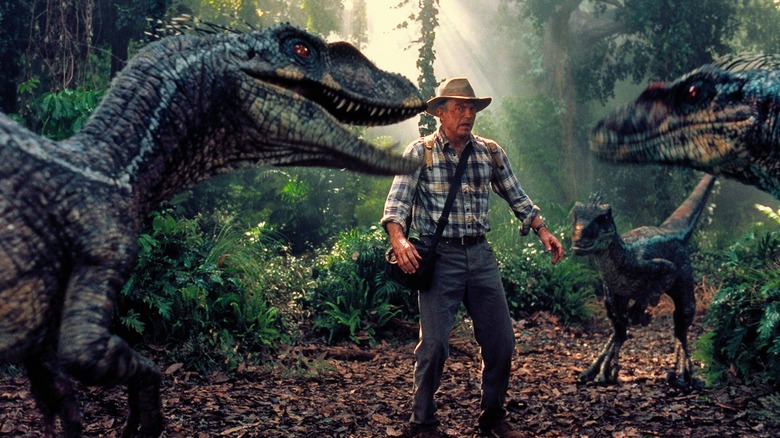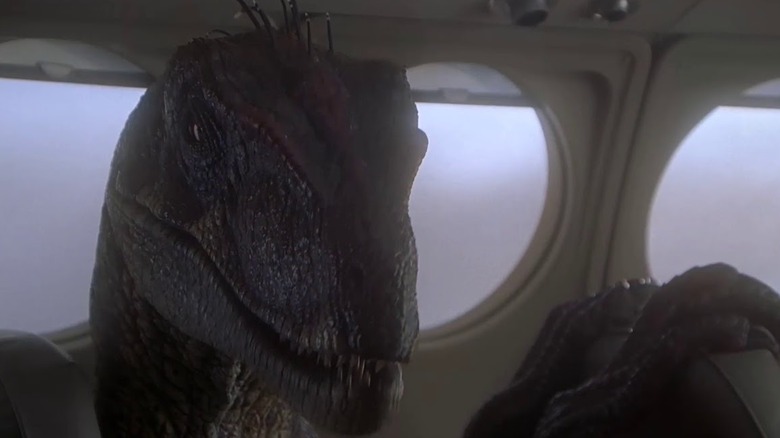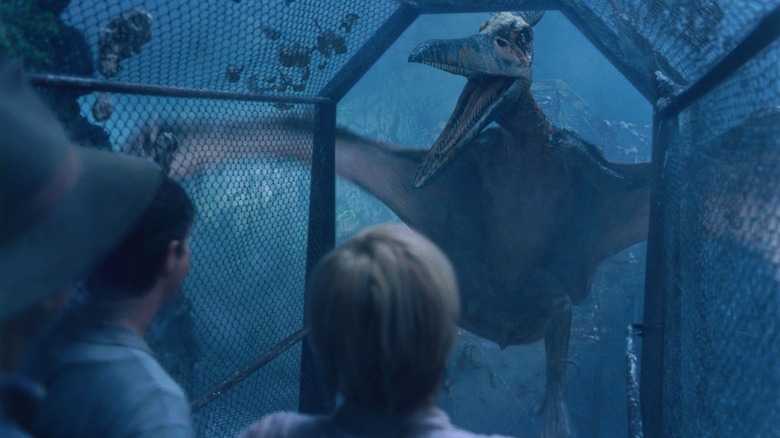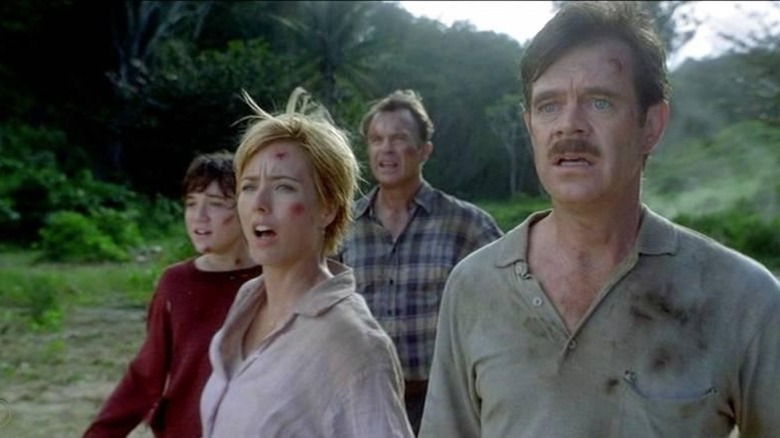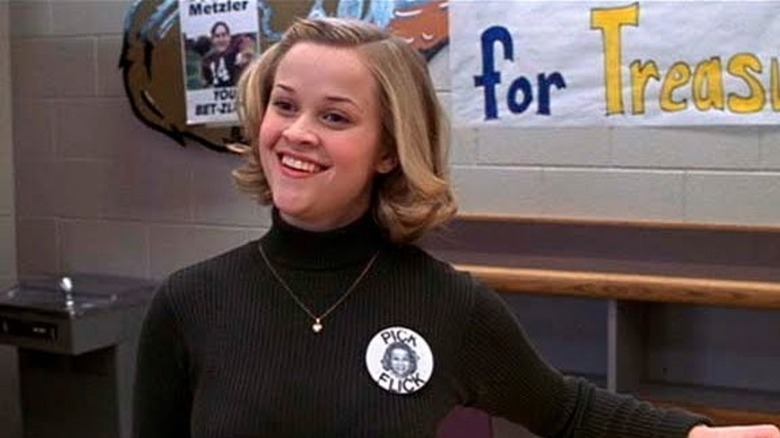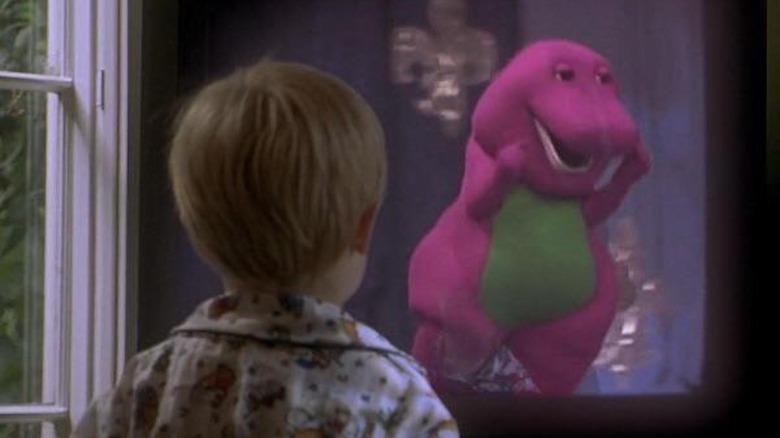You're All Nuts, Jurassic Park III Is The Best Jurassic Park Movie
Steven Spielberg's "Jurassic Park" was a B-movie transformed into a religious experience via the visual f/x wizardry of Dennis Muren, Phil Tippett, and Stan Winston. It represented a quantum leap in terms of computer-generated imagery (which everyone from Hollywood to Topeka already knew as CGI thanks to the watershed "morphing" imagery of James Cameron's "Terminator 2: Judgment Day"), casting a spell over moviegoers young and old with that cut from the awestruck expressions of Sam Neill, Laura Dern and Jeff Goldblum to the stunningly lifelike sight of a thirty-foot tall brachiosaurus. The photorealistic creation of this long-extinct creature from our ancient past blasted the film industry into its tech-obsessed future. It changed the life of many a burgeoning movie buff. For late Gen X-ers and early Millennials, "Jurassic Park" was their "Star Wars."
But once you get over the CG high, "Jurassic Park" is an intermittently thrilling monster flick elevated by a handful of masterfully crafted set pieces and an appealing cast making the most of thinly written characters. The most fascinating element of Michael Crichton's book, the then-novel concept of "chaos theory," gets reduced to a silly come-on by Goldblum's playboy mathematician, Ian Malcolm. Too much time is spent on kid-averse Alan Grant bonding with Hammond's precocious grandkids. Everything that isn't a set piece or Goldblum's iconically out-of-place beefcake portrait is shot with uncharacteristic indifference from Spielberg.
"Jurassic Park" has always struck me as post-"Hook" batting practice for Spielberg. I get why he made it. Prior to the triumph of "Schindler's List," he needed to re-establish himself as a blockbuster maestro. But it's just too much movie for such slender material. That's why, when I want to watch a film from this series, I go straight to Joe Johnston's ninety-three-minute "Jurassic Park III."
A rebound blockbuster
A visual f/x trailblazer whose credits stretch all the way back to the original "Star Wars," Johnston first approached Spielberg about directing a "Jurassic Park" sequel in 1993. Spielberg was already on board for "The Lost World," but, given the difficulties inherent in making these films, he was more than happy to hand the second sequel off to Johnston (who needed a hit himself after the 1999 commercial failure of his wonderful, woefully underseen "October Sky").
Despite a chaotic shoot that wrapped without a completed screenplay, Johnston delivered a lean-and-mean monster movie that had more in common with "The Valley of Gwangi" than an A-list Hollywood blockbuster. "Jurassic Park III" had a lot going for it when it hit theaters on July 18, 2001, starting with that release date. Whereas "The Lost World: Jurassic Park" roared its box office dominance over a coveted Memorial Day weekend slot in 1997, Johnston's movie arrived in the middle of a ho-hum summer led by "Pearl Harbor," "Lara Croft: Tomb Raider," "The Fast and the Furious," and Spielberg's ballyhooed "A.I. Artificial Intelligence," which confounded audiences at the time with its Kubrickian complexity and downer ending. Moviegoers were in dire need of a no-nonsense thrill ride. A return trip to the dino-dense Isla Sorna seemed like just the ticket.
A palpable hit that missed with audiences
"Jurassic Park III" opened to a gargantuan $50 million, but, like just about every other movie that summer, it didn't click with audiences. The film's B- Cinemascore augured a short theatrical run, and, indeed, the film fell short of box office expectations with a $181 million domestic gross. Since then, it's been derided as the worst entry in the series, responsible for Universal mothballing the franchise until 2015's "Jurassic World." You can't argue the numbers, but I'll never understand how anyone walked out of the theater feeling anything other than that momentary elation a rock-solid piece of B-entertainment (all too rarely nowadays) provides.
Let the dinos fight
Johnston telegraphs the film's pulpy intentions early on when Grant informs Ellie Sadler's toddler son that the brachiosaurus and triceratops toys he's mashing together in play combat would, as herbivores, have no interest in fighting one another. Carnivores? They'll brawl. It's a cheeky answer to a bit of criticism that had dogged the first two "Jurassic Park" movies. These are kid-skewing monster movies. Why can't you embrace the Ray Harryhausen of it all, and use your state-of-the-art CG to give us a dino dust-up for the ages? Though Johnston came into "Jurassic Park III" with a reputation for aw-shucks escapism based on "Honey, I Shrunk the Kids" and "The Rocketeer," you immediately get the sense he's on this kid's wavelength. It's time to let these beasts have at one another.
The biggest question dogging the narrative is why in the world would Grant want to go back to an island overrun with dinosaurs? This was evidently a T-rex-sized bone of contention during the scripting phase, and I think they made the right call by having a couple of rich thrill-seekers, Paul and Amanda Kirby (William H. Macy and Téa Leoni), pull a John Hammond and offer to fund Grant's velociraptor research for another two years if he'll play tour guide on a low-altitude flight over Isla Sorna. Given that the film opens with a child and his father going missing during a chintzy, parasail fly-by of the island, we suspect these people will tie together somehow. But the opening turns out to be a nifty misdirect when it's revealed that the man is actually Amanda's boyfriend. It gets worse for Grant when he discovers the Kirbys are divorced small businesspeople who've sunk just about everything they have into this rescue mission.
Jurassic Park III's Election connection
As is frequently the case on a studio tentpole, it's difficult to know which of the screenwriters who came and went during production are responsible for what you love/hate about the movie. It's my sense, though, that much of the witty banter strewn throughout "Jurassic Park III" (particularly the exchanges between Amanda and Paul) is the work of Alexander Payne and Jim Taylor. That the Academy Award-nominated duo behind 1999's brilliant "Election" would take a for-hire gig that went well beyond script doctoring (and seek credit for it) was a source of much merriment for me at the time. But this wasn't a case of blindly throwing money at smart, talented people in the hopes they'd bang out something workable. There's nowhere near enough screen time for us to get deeply invested in Amanda and Paul's broken marriage, but the scene where they come clean to each other about the crappy stuff they've surreptitiously done in the past (e.g. Paul lying about the totaled condition of the couple's Buick) is amusingly specific. Filmmakers typically don't take this kind of care with their characters in a late-in-the-day, CG-laden sequel.
Barney versus the spinosaurus
"Jurassic Park III" is riddled with uncommonly clever flourishes like this. Paul's lost satellite phone is an exquisite running gag. First, the device's telltale chime leads his son, Eric (Trevor Morgan), to track him down in the thick of an Isla Sorna forest. Only Paul doesn't have the phone. We hear the chime again. Cut to a standalone shot of the Spinosaurus, as menacing a creature as we've ever seen in one of these movies, but we're howling because, instead of a mighty roar, Paul's phone is echoing from its belly. The next time they find the phone, it's nestled deep in a pile of the beast's feces. Minutes later, they're using it to call Ellie in the middle of a dire Spinosaurus attack, only her son answers. Grant tries to coach the youngster into handing the phone off to her mother. The kid almost pulls it off, but he gets distracted by an episode of "Barney & Friends" in the other room. This is incredibly inventive crosscutting in the middle of an already expertly executed set piece. The T-rex attack in the first movie may be the series' gold standard, but this kind of way-outside-the-box thinking is what keeps me going to the movies.
Call in the Navy
"Jurassic Park III" isn't the meatiest buffalo out there, but Johnston uses just about every damn piece of it. The satellite phone, the raptor eggs, Grant's 3D-printed velociraptor larynx: it all gets paid off. How Eric managed to collect T-rex urine is a tad baffling, but at least he explains it away with a good laugh line ("You don't want to know"). It's an irreverent sequel that goofs on its predecessors' flaws, while indulging in wild flights of fancy like Grant's meme-able raptor dream. Michael Jeter plays a badass mercenary who gets used as human bait by a flock of raptors. The movie just up and ends with the Navy storming the Isla Sorna beach. It's pure pleasure all the way through. And thank god almighty, there's no artless exposition courtesy of Mr. DNA!
Only a fool would argue that Spielberg's "Jurassic Park" isn't one of the most important works of American cinema over the last fifty years, but only someone with a surfeit of nostalgia and way too much time on their hands would throw on the original when the fleet, funny "Jurassic Park III" is right there.
